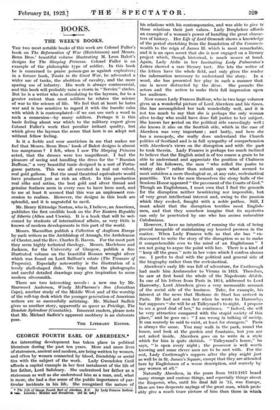BOOKS.
THE WEEK'S BOOKS.
THE two most notable books of this week are Colonel Fuller's book on The Reformation of War (Hutchinson) and Messrs. Benn Bros.' beautiful volume illustrating M. Leon Bakst's designs for The Sleeping Princess. Colonel Fuller is an example of the philosophic type of soldier. - In this book he is concerned to praise poison-gas as against explosives; in a former book, _Tanks in the Great War, he advocated a wider use of tanks, the abolition of cavalry, and the more sparing use of infantry. His work is always controversial, and this book will probably raise a storm in " Service" circles. But he is a writer who is stimulating to the layman, for to a greater extent than most soldiers he relates the science of war to the science of life. We feel that at heart he hates war and is too sensitive to regard it with the bucolic calm with which it is contemplated—if we can use such a word in such a connexion—by many soldiers. Perhaps it is this basic feeling about war which to the military expert gives Colonel Fuller's work that peculiar irritant quality, but which gives the layman the sense that here is an adept not without fellow feeling.
Is it a feeble and sour asceticism in me that makes me feel that Messrs. Rena Bros.' book of Bakst designs is almost too sumptuous ? I felt, when I saw The Sleeping Princess acted, that the dresses were too magnificent. I had the pleasure of seeing and handling the dress for the " Russian Buffoon," a very beautiful tunic designed in a sort of Portu- guese pattern. This was all executed in real cut velvet, real gold galloon. But the usual theatrical equivalents would have produced just as rich an effect. In this production real silks and satins, the best gold and silver thread and genuine feathers seem in every case to have been used, and to me at least it seemed that this was an unpleasant con- cession to realism. However, the designs in this book are splendid, and it is ungrateful to cavil.
Mr. Henry Kittredge Norton, who is, I believe, an American, publishes the first credible book on the Far Eastern Republic of Siberia (Allen and Unwin). It is a book that will be wel- comed by students of international affairs, as very little is known of modern developments in this part of the world.
Messrs. Macmillan publish a Collection of Anglican Essays by such writers as the Archbishop of Armagh, the Archdeacon of Chester, and the Rev. Charles E. -Raven. For the most part they seem highly technical theology. Messrs. Maclehose and Jackson, for the University of Glasgow, publish a fine illustrated volume on the beautiful Roman wrought silver which was found on Lord Balfour's estate (The Treasure of Traprain). Especially noteworthy is the illustration of a lovely shell-shaped dish. We hope that the photographs and careful detailed drawings may give inspiration to some modern silversmith.
There are two interesting novels : a new one by Mr. Sherwood Anderson, Windy McPherson's Son (Jonathan Cape), another study of the Middle West and of the worship of the roll-top desk which the younger generation of American writers are so successfully satirizing. Mr. Michael Sadleir gives us another story, apparently as queer as Privilege, The Desolate Splendour (Constable). Innocent readers, please note that Mr. Michael Sadleir's apparent snobbery is an elaborate pose.
THE LITERARY EDITOR.










































 Previous page
Previous page